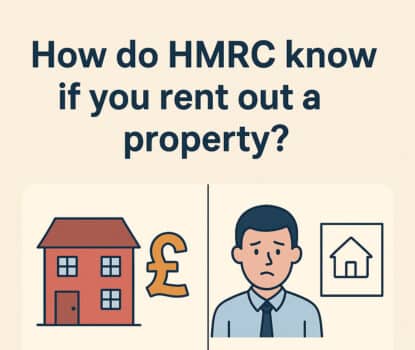How do HMRC know if you rent out a property

If you’re renting out your property in the UK, you need to know what your responsibilities are as a landlord, especially when it comes to taxes. A lot of landlords, especially those who became landlords by accident or for the first time, wonder, “How does HMRC even know that I rent out a property?” The answer is that they have different ways of finding out, and not reporting rental revenue can lead to fines, interest, and investigations.
How Does HMRC Know Undeclared Rental Property Income?
In this article, we will discuss the ways in which the HMRC may find rental income that has not been declared, as well as the steps that you can take to ensure that you continue to comply with the regulations while renting out your home.
Land Registry and Council Tax Data
Within the Land Registry database, which contains ownership information, HMRC has access to the information. If your name appears on a property’s title records but you are not identified as the resident for council tax reasons, this may create concerns, especially if services and communications are routed elsewhere.
Letting Agent and Property Platform Reports
Letting agencies are obligated to comply with anti-money laundering (AML) regulations, and most of them should disclose their activities to HMRC. Online platforms such as Rightmove, Zoopla, or Airbnb may submit data to HMRC through digital footprint analysis. This is the case even if you manage your home on your own.
Tenant and Neighbour Reports
Anonymous tips can be provided to HMRC by tenants, neighbours, or even acquaintances who have issues with the service. In case there are disputes over deposits, maintenance, or situations that are not up to par, you may need to pay tax on the rental income involved.
Bank Account Monitoring
If you get frequent payments from renters or rental agencies, these transactions can be tracked. If HMRC suspects that you have income that you have not declared, they have the right to seek information directly from your bank during investigations.
The Let Property Campaign
With the help of this initiative, which was initiated by HMRC to encourage landlords to come forward voluntarily, non-compliant landlords have been successfully identified. Data gathered throughout the campaign is cross-referenced with other databases to identify irregularities.
Digital Traces & Social Media
Evidence might include posts or listings of your rental property on platforms such as Facebook Marketplace, Gumtree, or even Instagram. Digital forensics has become extensively used by HMRC to uncover undisclosed property income during the past few years.
Paying rental income tax
You are taxed on all rents paid on rented houses. Mortgage interest payments are one expenditure that may be deducted when calculating profit from rental income, thus reducing your tax liability. Profits are those that remain after adding in rental income and removing all expenses or allowances that may be claimed. When you lease more than one building, you add the profit or loss to the total property value to get the total property value. However, income losses from abroad assets should be kept separate from property in the UK.
How is the rental income tax calculated?
As a professional landlord, you must pay income tax and keep track of all profits from rent, non-refundable deposits, and money paid for repairs, just like any other form of income. The entire amount must be reported to HMRC, and the rental income tax obligation is calculated by the personal tax category in which your overall income falls.

How do HMRC know if you rent out a property
What Happens If You Don’t Declare Rental Income?
While some landlords hide their rental income on purpose, others may fail to do so due to mistakes or preoccupation with running a property business. This is not an excuse for neglecting to declare all of your property rental income and revenue.
If HMRC suspects that a landlord has been intentionally evading taxes, they may be able to recover 20 years’ worth of tax payments. On the other hand, HMRC will evaluate each case on an individual basis. In addition to tax relief, they have the power to impose a penalty equivalent to the total of delayed and unpaid taxes, which can significantly raise your tax burden.
Through the buy-to-let property campaign, the HMRC allows landlords to declare any undisclosed rental income. This option allows landlords to keep up with their tax concerns under the best conditions available. It’s also important to pay the landlord’s taxes, which include things like council tax and utility bills. You are given 90 days to clear your dues after you have disclosed your undeclared income and the amount of council tax that is owed.
How to Stay Compliant with HMRC
To avoid fines, here are some important tips:
- Register with HMRC: If your rental income reaches £1,000 per year, you must file for Self Assessment and declare it to HMRC to avoid any tax liability.
- Keep Detailed Records: Keep all receipts, rental agreements, and repair bills. You’ll need these when filing your tax return.
- Use an Accountant or Letting Agent: Qualified agents or accountants can help you in maintaining compliance and claiming permitted costs, therefore lowering your tax burden.
- Take Advantage of Allowances: If you jointly own the property, your income may be divided for tax purposes, or you may qualify for the £1,000 property allowance.


